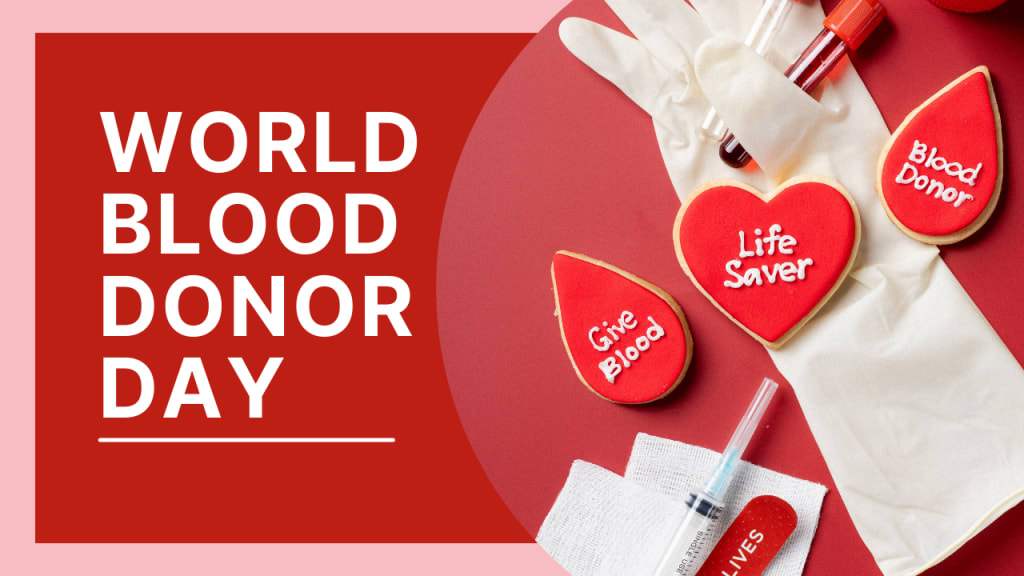World Blood Donor Day: The Gift of Life
In this article, we will delve into the significance of World Blood Donor Day

Introduction
Every year on June 14th, World Blood Donor Day is celebrated worldwide to raise awareness about the importance of blood donation and to honor the selfless individuals who donate their blood to save lives. This day serves as a reminder of the critical role that blood donors play in healthcare systems and their contribution to saving millions of lives globally. In this article, we will delve into the significance of World Blood Donor Day, the need for blood donations, the impact of blood donors, and how you can get involved in this life-saving endeavor.
Understanding World Blood Donor Day
World Blood Donor Day was established by the World Health Organization (WHO) to promote the importance of safe blood and blood products and to acknowledge the significant role of voluntary blood donors. The day aims to inspire more people to become regular blood donors and encourage governments and health institutions to ensure the availability and accessibility of safe blood supplies.
The Importance of Blood Donations
Meeting the Constant Demand
Blood is an irreplaceable resource that is constantly in demand for various medical procedures, surgeries, and treatments. It is crucial to maintain an adequate supply of blood to meet the needs of patients requiring transfusions due to accidents, surgeries, childbirth complications, and medical conditions such as cancer and anemia. Regular blood donations are essential to ensure that hospitals and healthcare facilities have enough blood on hand to save lives.
Supporting Medical Procedures and Treatments
Blood donations are not only vital for emergency situations but also for planned medical procedures such as organ transplants, cardiovascular surgeries, and treatments for blood disorders. These procedures often require large amounts of blood, and without an ample supply, these life-saving interventions may be compromised. By donating blood, you can directly contribute to the success of these procedures and improve the chances of positive outcomes for patients.
Emergency Situations and Natural Disasters
During times of crisis, such as natural disasters or large-scale accidents, the demand for blood rises exponentially. Blood transfusions are crucial in emergency situations to stabilize patients, compensate for blood loss, and save lives. By participating in blood donation drives and being a regular donor, you can help ensure that blood is readily available during times of crisis, providing swift assistance to those in urgent need.
The Impact of Blood Donors
Saving Lives
Every blood donation has the potential to save multiple lives. By donating blood, you are directly contributing to the well-being of patients who rely on transfusions for their survival. Whether it's a premature baby fighting for life, a cancer patient undergoing treatment, or an accident victim in need of immediate transfusion, your contribution can make a significant difference and give these individuals a chance at life.
Enhancing Healthcare Systems
Blood donors play a vital role in strengthening healthcare systems worldwide. Their contributions alleviate the burden on hospitals and medical facilities, ensuring a stable supply of blood for patients. By being a regular donor, you help maintain a sufficient inventory of blood products, reducing the strain on healthcare resources and enabling healthcare providers to deliver timely and effective care.
Promoting Community Spirit
World Blood Donor Day fosters a sense of community and solidarity. It brings people from diverse backgrounds together to contribute to a common cause—saving lives. By participating in blood drives and donating blood, you join a network of individuals who share the same altruistic values and the desire to make a positive impact on society. Together, we can create a community that prioritizes the well-being of others and embraces the spirit of giving.
How to Participate in World Blood Donor Day
Find a Local Blood Donation Center
Start by locating a local blood donation center or blood bank in your area. These centers are equipped to collect blood donations and ensure their safe storage until needed. You can usually find the contact information and address of your nearest center by searching online or contacting your local health department.
Check Eligibility Requirements
Before donating blood, it's important to ensure that you meet the eligibility requirements set by the blood donation center. These requirements typically include age restrictions, weight criteria, general health conditions, and a lack of high-risk behaviors. By adhering to these guidelines, you can ensure that your donation is safe for both you and the recipient.
Prepare for Your Donation
On the day of your donation, make sure you are well-hydrated and have eaten a nutritious meal. Wear comfortable clothing with sleeves that can be easily rolled up. During the donation process, a healthcare professional will guide you through the steps and answer any questions or concerns you may have.
Spread the Word
In addition to donating blood, you can contribute to the success of World Blood Donor Day by spreading awareness among your family, friends, and community. Utilize social media platforms, local events, and word-of-mouth to inform others about the significance of blood donation and the impact it can have on saving lives. Encourage others to participate and join the global movement of blood donors.
Conclusion
World Blood Donor Day is an occasion to honor the invaluable gift of life provided by blood donors around the world. By donating blood, you have the power to save lives, support medical procedures, and contribute to the well-being of your community. Embrace the spirit of giving, become a regular blood donor, and be a part of a global movement that celebrates the selflessness and generosity of individuals who make a difference every day.
FAQs
Can I donate blood if I have a medical condition?
It depends on the specific medical condition. Certain conditions may restrict or temporarily defer your eligibility to donate blood. It is best to consult with a healthcare professional or the blood donation center to determine your eligibility.
How often can I donate blood?
The frequency of blood donations varies depending on local regulations and the individual's health status. Generally, donors can donate whole blood every 8 to 12 weeks. However, specific guidelines may differ between countries and donation centers.
Are there any side effects of donating blood?
Most blood donors experience no significant side effects. However, some individuals may experience temporary symptoms such as dizziness, fatigue, or bruising at the needle insertion site. These symptoms are usually mild and resolve quickly.
Can I donate blood if I have recently traveled to a different country?
Traveling to certain countries or regions may result in temporary deferral from blood donation due to potential exposure to infectious diseases. It is advisable to check with the blood donation center for specific guidelines regarding recent travel.
How long does the blood donation process take?
The blood donation process typically takes about 30 minutes to an hour, including registration, medical screening, and the actual donation. However, the duration may vary depending on individual factors and the donation center's procedures.





Comments
There are no comments for this story
Be the first to respond and start the conversation.